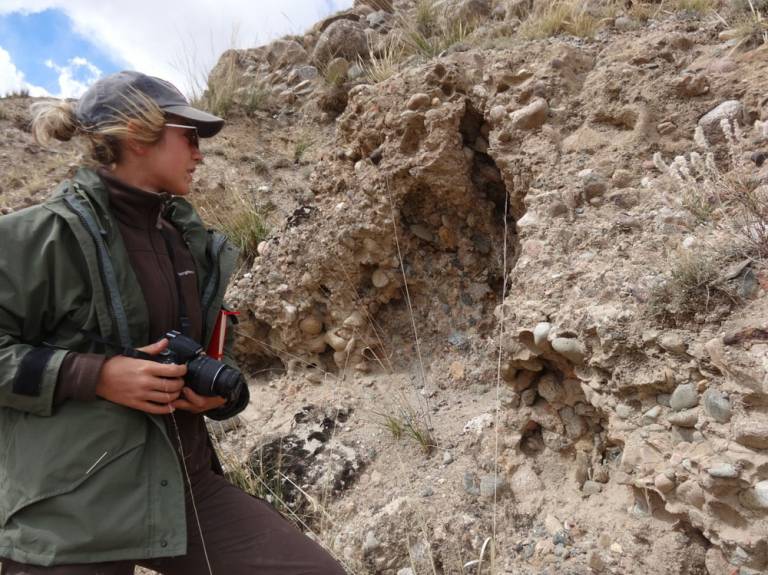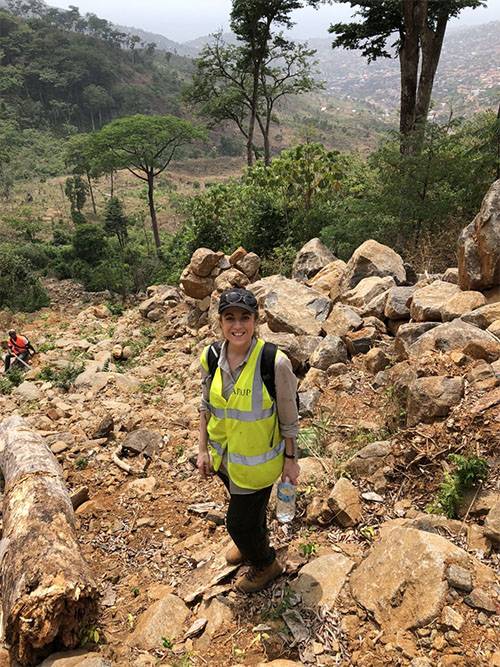Grace Campbell gained a Master in Science in Earth Sciences (International Programme) at UCL in 2010, followed by an MPhil and PhD at the University of Cambridge
I graduated from the UCL Earth Sciences Department in 2010 with a first-class honours MSci degree in Environmental Geoscience with an international year at Arizona State University (ASU).

Following my four years at UCL I went on to complete an MPhil (masters) at the University of Cambridge in Environmental Science and Remote Sensing at the Department of Geography. I continued at Cambridge in the Earth Sciences Department and in 2015 completed my PhD in continental tectonics and earthquake hazard focussed in central Asia.
Currently I work at Arup, a global design and engineering consultancy, as a senior geologist specialising in natural hazard and risk projects. I work with designers, engineers and international development consultants to increase the resilience of society and the built environment to earthquakes, flooding, landslides and climate change-related shocks and stresses. I have been in this role for the last 4.5 years.
My proudest working achievement includes been asked by the World Bank to join their rapid damage and loss assessment mission to Freetown Sierra Leone following the devasting landslide, debris flow and flooding that killed over 1,000 people in August 2017. During this two-week mission we worked with local stakeholders, international specialists and NGOs from all different sectors such as environment, infrastructure, buildings, water, sanitation and hygiene, health, education and telecommunications etc. to document the socioeconomic and physical losses resulting from the disaster. We also assessed residual hazard at the landslide site. At the end of these two weeks we presented our findings and the very early road map to recovery and regeneration to the President of Sierra Leone and to the Sierra Leonean Government. This was a harrowing experience, but it was also hugely rewarding to work with Sierra Leonean colleagues and support the capital city in responding to this disaster.

The journey to my current role was a bit of an adventure, I was always fascinated in the natural world, research and travel and this led me to apply to the Environmental Geoscience MSci degree at UCL. This degree covers fundamental topics such as natural hazards, climate change, and broadly how systems such as the biosphere, atmosphere, deep earth and earth-surface processes interact in the present, how they interacted in the past and how they may interact in the future. It is an inspiring and extremely relevant multidisciplinary subject as we are faced with the challenge of how to live sustainably on Earth.
During my time at UCL I had the opportunity to learn alongside the world’s top academics and undertake field work in beautiful parts of world including the Italian Alps, Vesuvius and Naples, the Spanish Pyrenees, northern Germany, and the Isle of Skye, with other likeminded, inquisitive students (many of who remain my great friends today!). At Arizona State University, I integrated into American college life with pool parties, baseball, basketball and tailgating and I was afforded the invaluable opportunity to learn from NASA scientists undertaking cutting-edge planetary geology research on Mars and other planets in our solar system and beyond. My time at the School of Earth and Space Exploration (SESE) in Arizona sparked my interest in remote sensing and planetary geology and I further developed skills in field research from fascinating trips to the Mojave Desert, Monument Valley, the Grand Canyon and the pristine Meteor Crater.
At Cambridge as part of my masters I was initially interested in volcanology and researched volcanism and volcanic hazard in Yemen using multispectral satellite imagery combined with the major and minor element chemistry of lava rock samples. But when I saw the possibility to undertake intrepid field expedition work in a relatively untouched part of the world, Central Asia, I decided to apply for a PhD position with the Cambridge Earth Science Department. I worked in remote, beautiful and mountainous parts of Kazakhstan and Kyrgyzstan surveying and characterising previously unknown faults that had generated large-magnitude earthquakes in the pre-historical past. I drank fermented horse milk with nomads, slept underneath the stars and the glaciers, worked with local nationals and with national science institutions to build capacity in earthquake geology. I also worked, as part of a multidisciplinary team, alongside other exceptional international researchers from France, the UK, and Germany.
At all points, I have followed what has fascinated me and what I am passionate about and I am passionate to understand how human society and the natural world can exist safely and sustainably. I joined Arup because I wanted to see how engineers and designers, who shape the built environment and in many ways are responsible for implementing sustainable development, use the type of science and research that is published in academia to inform their work. At Arup, I continue to learn about natural sciences and many other subject areas such as ecology, seismic deign, geotechnical engineering and infrastructure, and I constantly apply the knowledge and skills I developed during my time at UCL and at Cambridge. I continue to be inspired by the variety of projects and opportunities there are now and will be in the future. My advice to students pursuing an undergraduate or postgraduate degree would be to follow your passions and your genuine interests. In doing this, you’re in for a lifelong adventure.
 Close
Close

